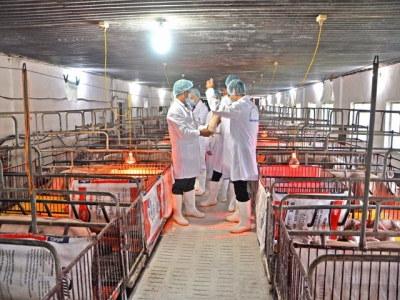Livestock sector aims to enhance quality, safety

With pork accounting for 75 percent of meat consumption in Vietnam, experts are urging greater emphasis on traceability and quality in order to protect consumers and enhance export prospects.
More professional models
Speaking at a recent workshop in Hanoi, Vo Trong Thanh from the Ministry of Agriculture and Rural Development’s Department of Livestock Production said that during the 2008-2018 period, the Vietnamese livestock sector had achieved five important advances. Productivity had increased from 15 percent to 20 percent, while about 30 percent of livestock farms were converted to industrial and professional models. Large corporations such as Hoa Phat and Masan entered livestock production, and linkages were established between production and consumption. The livestock sector had shifted towards quality and efficiency.
Tran Dang Ninh, director of the Center of Quality Verification and Consultancy for Agro, Forestry and Fisheries under the Ministry of Agriculture and Rural Development, said Vietnam currently ranks seventh in the world in terms of pig production. The number of herds has increased by 2.4 percent in the past decade, while the slaughter rate has increased by 33.5 percent. Pork accounts for 75 percent of annual meat consumption in Vietnam, ranging from 3.5 to 3.7 million tonnes per annum. Vietnam has about 2.6 million pig farms, creating jobs for about seven million workers.
However, the livestock sector still faces many challenges. According to Vo Trong Thanh, linkages between production and consumption are still not strong enough. Communicable diseases are difficult to control, while restructuring remains slow. Pork is mainly consumed domestically, while the export volume is very small. Pork prices fluctuate sharply, hurting farmers, while the quality and safety of Vietnamese pig products are not well controlled.
National supply chain
According to the results of a four-year project developed by the Department of Livestock Production and the Embassy of the Netherlands, only eight percent of slaughterhouses in the northern region had signed contracts to provide pork to traders and companies. In the south that figure reaches 42 percent in Ho Chi Minh City and 50 percent in Dong Nai Province.
According to the results, most pig farmers do not buy breeding pigs, instead selecting healthy baby pigs from their herds to raise, making the quality of breeding pigs unsustainable.
Additionally, modern abattoirs only operate at 50 percent capacity because people still prefer traditional slaughterhouses, many of which continue to operate with a license.
To ensure food safety and sustainable development of the Vietnamese pig industry, Ron Dwinger, the project coordinator, said a biosecurity approach is required for pig farms. That means improving farm hygiene, using appropriate antibiotics and complying with national quality and traceability standards of all pigs brought to abattoirs.
Building a national supply chain to provide safe pork is an essential requirement for the livestock sector in Vietnam during the period of international integration, Dwinger said.
Ina Enting, the project coordinator, said that Vietnam should prioritize closed value chains as it is a viable model. In addition, strengthening efficiency, controlling food safety, and enhancing state management are mentioned as necessary.
According to Vo Trong Thanh, over the next 10 years, the number of professional farms is expected to increase, and their output is expected to account for 70-75 percent of all animal products. Meanwhile, the number of small farming households is projected to fall by 5-7 percent annually.
The livestock sector is striving for higher quality, improved productivity and competitive prices, as well as increased domestic sales and exports to ASEAN, the Middle East, Japan, China and the Republic of Korea.
Related news
 Long An improves quality of locally grown fruit
Long An improves quality of locally grown fruit The Cửu Long (Mekong) Delta province of Long An’s agriculture sector has proposed solutions to improve the quality and output of dragon fruit to meet export
 Cần Thơ uses high-tech to increase farmers’ profits
Cần Thơ uses high-tech to increase farmers’ profits The Mekong Delta city of Cần Thơ is promoting advanced farming techniques to increase profits for farmers and enhance product competitiveness.
 Agricultural sector needs more locally made machinery
Agricultural sector needs more locally made machinery The People’s Committee of Cần Thơ City and the Việt Nam Association of Mechanical Industry (VAMI) met recently to address the urgent need to produce agricultura